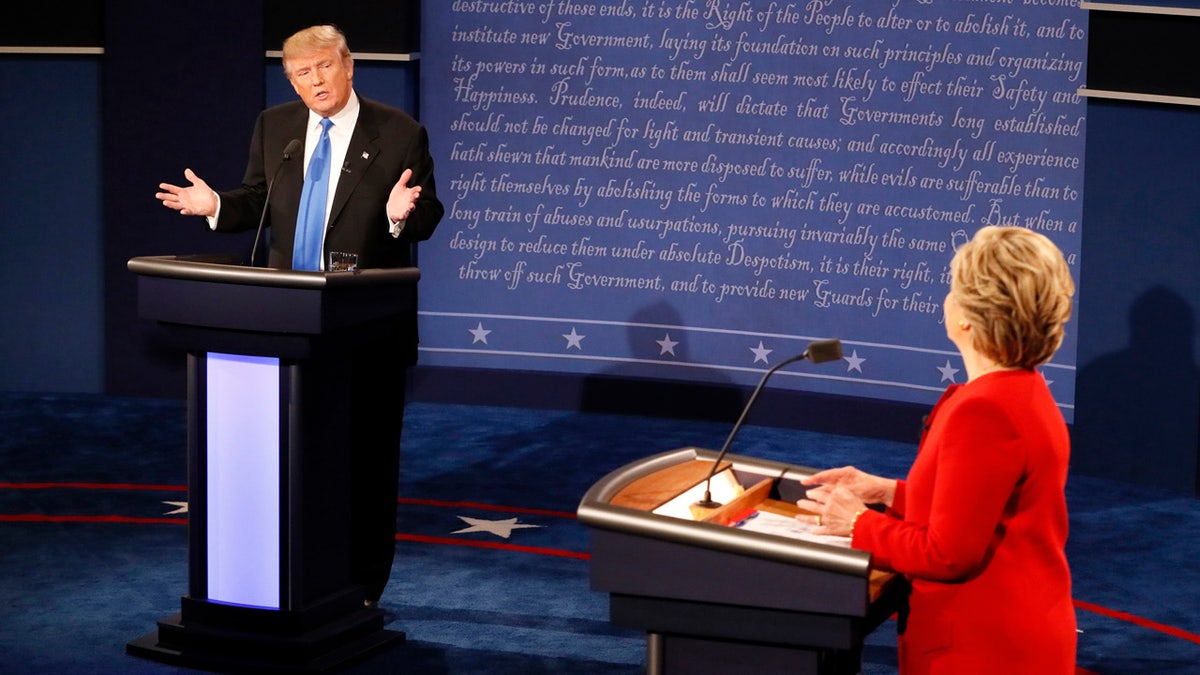
Republican presidential nominee Donald Trump gestures towards Democratic presidential nominee Hillary Clinton during the presidential debate at Hofstra University in Hempstead, N.Y., Monday, Sept. 26, 2016. (Rick T. Wilking/Pool via AP)
While the U.S. presidential election has many in the Washington media focused on the latest Team Clinton emails released by Wikileaks, the Associated Press has reported from Eastern Europe that Russia has been quietly trying to influence another election - the Moldovan presidential election on October 30.
It wasn’t a surprise to many of the 150 million people living in the region. Russia’s influence can be a daily dilemma, after all, for the countless people of the former Soviet states.
But in the U.S., reports that Russia is trying to influence the 2016 presidential elections is unfolding in many political newsrooms like it’s a new occurrence.
Even Hillary Clinton, the former Secretary of State, is acting shocked that Russia is purportedly trying to hack into official computer systems.
Why would Russia be working to influence the U.S. elections? Experts say it is less likely that Putin and his allies prefer a certain candidate, but they want to ensure that whoever is elected leader of the free world understands that Russia is on the offense and unintimidated by America’s traditional role.
While the allegations are still unproven, the U.S. government nevertheless is saying they believe it to be true. But Russian or Russian-approved tactics like cyber warfare and campaigns of misinformation have been happening for decades.
The Moldovans are stepping forward to confirm their suspicions of election lobbying by foreign actors. With the Moldovan presidential election in roughly two weeks, authorities in the capital of Chisinau believe the U.S. isn’t the only place where the Russians are working to affect the outcome of a national election.
The Washington Post recently reported, “Parliament Speaker Andrian Candu said the government thinks “the Russians are financing political parties and leaders” and backing anti-government protests.
Candu told The Associated Press that Moldova’s leaders also suspect Russia of “manipulating media outlets and doing propaganda.””
The Moldovan Speaker visited with U.S. officials in Washington just a few weeks ago to celebrate the 25th anniversary of Moldovan Independence.
While sitting down with his counterpart, Speaker of the House Paul Ryan, Senate Foreign Relations Chairman Bob Corker and several Congressmen, Candu answered questions from U.S. officials on how Russia was trying to influence the Moldovan election.
Senator Corker’s office refused to talk about the details of the meeting.
But Deputy Assistant Secretary of State Bridget Brink met with the Moldovan officials and offered this assessment, “we applaud the positive actions taken by the Moldovan government … Moldova has passed necessary and often difficult reforms, including in the justice and banking sectors. And it has already begun to reap the benefits of those reforms.”
State Department officials know that the reforms are to ensure an end to the Russian money laundering that has consumed Moldova.
People familiar with Candu’s visit said one target of the Russians in Moldova is the 10 month old government of Prime Minister Pavel Filip, a technocrat working towards EU integration, and his political party, the Democratic Party.
The anti-government forces suspected of being financed by the Russians and their allies have even convinced a U.S. congressman to be a part of their misinformation campaign of propaganda.
Congressman Randy Weber, a former owner of a heating and air-conditioning company in Texas with two terms in Congress, was convinced to author House Resolution 896 attacking the ruling party and Vice Chairman Vladimir Plahotniuc of Moldova.
Weber’s spokeswoman confirmed that Weber has never been to Moldova. She also said Weber didn’t attend the Moldovan Independence celebration where U.S. State Department officials complimented the Moldovan government’s implementation of anti-corruption laws and their move closer to the West.
Weber decided to author his pro-Russian House Resolution after meeting with Moldovan Mihail Gofman, a man on the run from the Moldovan government and who is refusing to answer questions about his involvement in money laundering schemes benefitting Russian allies. For his part, Weber emailed a statement saying: “I, along with my colleague Representative Trent Franks of Arizona believe that this House Resolution is a step in the right direction to show our support behind Moldova’s efforts to rid themselves of corruption and promote democracy.”
Moldovan officials, however, believe Gofman is being paid by Russian allies looking to bring down the current Moldovan government.
These attacks on the Moldovan government and ruling party leaders are clearly designed to stop the pro-West reforms inside Moldova.
The lobbyists and political operatives hired by wealthy Moldovan rivals serve as a reminder that Russia and its allies continue to look for ways to stop the slide toward Europe that many of their former Soviet states are on.
But why would Russia be working to influence the U.S. elections? Experts say it is less likely that Putin and his allies prefer a certain candidate, but they want to ensure that whoever is elected leader of the free world understands that Russia is on the offense and unintimidated by America’s traditional role.
It will be a test for whoever wins in November.
Over the last eight years, Russia has become accustomed to being unchallenged in their aggression throughout Eastern Europe and the Middle East. Changing the current global status quo is one of the most important jobs of the next president.








































